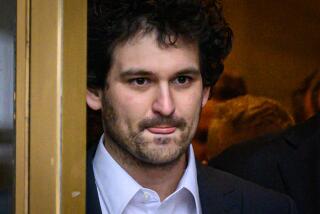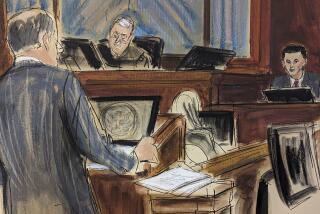Fastow Spoke of ‘Gray Area’ for Enron’s Partnerships
- Share via
WASHINGTON — Former Enron Corp. Chief Financial Officer Andrew S. Fastow, who engineered the company’s off-the-books partnerships, acknowledged last summer that its financial practices “may be in a gray area,” but insisted that they had been approved by the company’s leadership.
Fastow’s comments, which came in an interview with Enron’s outside law firm Aug. 27, suggest he and other insiders were aware that Enron’s financial practices could come under attack. Along with other documents released Tuesday, they raise new questions about how much former Chairman Kenneth L. Lay and former Chief Executive Jeffrey K. Skilling knew about the company’s problems and its off-the-books partnerships.
According to an internal report by law firm Vinson & Elkins, Fastow told attorneys that Enron’s accounting measures had been approved by the “office of the chairman,” which consisted of Lay and Skilling.
Both Lay and Skilling have contended they had only a dim awareness of the financial maneuvers that triggered Enron’s filing for bankruptcy protection Dec. 2.
“Clearly, the interviews conducted by Vinson & Elkins don’t jibe with all of the testimony that we’ve received before the committee so far,” said Ken Johnson, spokesman for House Energy and Commerce Committee Chairman W.J. “Billy” Tauzin (R-La.). He declined to elaborate.
Fastow also said that Enron executives were worried that the partnership deals would be publicly exposed.
“The primary issue discussed was the potential ‘Wall Street Journal risk’--i.e., the bad cosmetics being aired publicly,” according to notes from the interview with Fastow by attorneys at Vinson & Elkins.
A summary of the interview--part of the law firm’s investigation into allegations raised in August by Enron Vice President Sherron S. Watkins in a memo to Lay--was released Tuesday by a congressional committee. The investigation was ordered by Lay in response to the Watkins memo.
Earlier this month, Fastow, Lay and other key figures called to testify before Congress invoked their 5th Amendment right against self-incrimination.
Fastow told attorneys that Enron’s board and its outside auditor, Andersen, signed off on the partnership transactions, according to the documents. These deals, Fastow said, enabled Enron to avoid write-downs on its assets and served as a “buffer” for its profit-and-loss statement. Investigators say that potentially is an improper use of the partnerships.
“Although the structure may be in a gray area, it is fully approved by [Andersen] and is fully disclosed,” the law firm quoted Fastow as saying.
In a separate document, Lay is quoted as telling the Enron board’s internal investigating committee that Skilling was deeply troubled by Enron’s falling stock price before he resigned Aug. 14 and that he broke into tears when he delivered his resignation to the board of directors.
Skilling, who served just six months as chief executive, has maintained that he resigned for personal reasons and had no inkling of the company’s impending collapse.
A Lay spokeswoman declined to comment Tuesday; Skilling’s spokeswoman could not be reached.
But nearly six weeks before Enron publicly disclosed its problems, the company’s chief accounting officer, Richard A. Causey, said Lay and Skilling had been warned about the potential risks created by the partnerships, according to a summary of his Aug. 31 interview with Vinson & Elkins released Tuesday.
Causey also said that an “unfortunate error” in accounting would require Enron to take a $1-billion charge against shareholder equity, but he characterized the issue as a “simple mistake that now requires correction,” according to the summary of his interview.
Causey’s comments indicate that some high-ranking Enron executives knew about the company’s accounting problems more than a month before they were publicly disclosed.
On Oct. 16, Enron announced a $1.2-billion charge against shareholder equity related to the Fastow-run partnerships.
Despite the comments by Fastow and Causey, Vinson & Elkins eventually concluded that Enron did nothing improper and said the matter did not warrant further investigation.
The law firm has been criticized by lawmakers and the Enron board investigating committee for failing to conduct a more thorough probe of issues raised in the interviews.
A spokesman for the law firm declined to comment Tuesday.
Causey, who has refused to comment publicly since Enron’s collapse and was fired last week, said that Lay and Skilling both knew that the so-called Raptor partnerships were sinking under heavy losses and would need to be supported by issuing more Enron stock.
“Raptor was created to withstand volatility,” Causey told the law firm. “It was not created to withstand declining asset values of the magnitude that have been experienced. . . . All these consequences were known to Jeff Skilling and Ken Lay through discussions of this structure.”
Congressional staffers said the documents raise new questions about what Lay and Skilling knew and when they knew it. But ultimately, lawmakers--who are beginning to turn their focus to legislative reforms--said such questions would be left to criminal investigators.
“The whodunit is ultimately of interest more to the FBI and SEC,” said Rep. James C. Greenwood (R-Pa.), chairman of the House Energy and Commerce subcommittee on oversight and investigations.
Representatives for Fastow and Causey declined to comment.
In his interview with Vinson & Elkins, Fastow expressed “irritation” with the Watkins memo, in which she warned that Enron could “implode in a wave of accounting scandals.” Watkins testified last week that Fastow tried to fire her for complaining to Lay.
A separate document released Tuesday revealed that Enron officials did seek legal advice on Aug. 24 from Vinson & Elkins about the “risks associated with discharging (or constructively discharging) employees who report allegations of improper accounting practices.”
The firm advised Enron that firing such an employee might leave the company vulnerable to a wrongful termination lawsuit and would increase the risk of a complaint to government regulators.
Eventually, Watkins was transferred, at her request, to another job within the company.
Fastow dismissed Watkins’ concerns, saying she was “second-guessing” Andersen’s professional opinion and insisting that Enron’s use of stock to support the off-the-books partnerships had been fully disclosed in its public filings.
Andersen spokesman Patrick Dorton said the firm was offering advice only on whether the transactions complied with generally accepted accounting principles.
“These represent business decisions made by the Enron board and management,” Dorton said.
Another document released Tuesday was a 17-page memorandum of a Jan. 16 interview with Lay, conducted by law firm Wilmer, Cutler & Pickering and accounting firm Deloitte & Touche, which assisted in the internal investigation of the company’s collapse.
Lay said that Skilling told him last year that he wanted to spend more time with his family, but that he was also taking Enron’s stock decline personally and could not sleep at night.
Another document released by congressional investigators Tuesday shows that Lay signed at least one of the approval sheets authorizing a transaction by one of Fastow’s partnerships to purchase access to Enron’s fiber-optic network. Earlier this year, Lay told the internal investigating committee that he was unaware of the partnership details.
More to Read
Inside the business of entertainment
The Wide Shot brings you news, analysis and insights on everything from streaming wars to production — and what it all means for the future.
You may occasionally receive promotional content from the Los Angeles Times.











